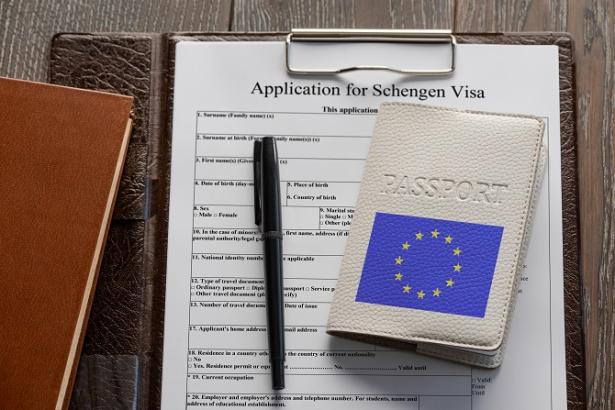What are the requirements for a Schengen visa?
Are you planning to travel to the Schengen Area? Read on to discover which documents you need to apply for a visa on Europ Assistance Schengen.

What are the requirements for a Schengen visa?
The Schengen Area is a free movement zone without internal border controls. It includes 26 countries (22 members of the European Union and 4 non-members) and 3 micro-nations (Monaco, Saint-Martin and the Vatican).
While citizens of some non-member countries are exempt from the SCHENGEN visa, others must apply for a short-stay visa to enter the Schengen area and stay for 3 months. Also called a Schengen visa, it allows you to travel to all of the Schengen area countries during your trip, save for any exceptions.
The application is very simple and requires a few documents that we review in this article.
Which countries do you have access to with a Schengen visa?
- Germany
- Austria
- Belgium
- Denmark
- Spain
- Estonia
- Finland
- France
- Greece
- Hungary
- Iceland
- Italy
- Malta
- Latvia
- Liechtenstein
- Lituania
- Luxembourg
- Norway
- The Netherlands
- Poland
- Portugal
- Czech Republic
- Slovakia
- Slovenia
- Sweden
- Switzerland
How does the Schengen visa work?
Also called the Uniform Schengen Visa (USV), this visa gives you the authorisation to stay in the Schengen Area for one or several periods of 90 consecutive days from the date of entry. It is a sticker placed in your passport and gives the holder permission to:
- Single entry: the traveller may enter one of the Schengen Area countries one time. Once the traveller has left, the visa expires,
- Double entry: the traveller may enter one of the Schengen Area countries two times before their visa expires,
- Multiple entry: the traveller may enter and exit the Member Countries of the Schengen Area as many times as they wish during the validity of the visa, as long as they do not exceed 90 days every 6 months.
Which documents are required for a Schengen visa?
- The visa application form, filled out and signed
- A recent ID photo
- A passport valid for a minimum of 3 months from the departure date and granted less than 10 years ago, with at least 2 blank pages inside
- A photocopy of all previous Schengen visas
- Travel information: round trip airline tickets with entry and exit dates for the Schengen Area, proof of lodging, etc.
- Travel insurance that is valid in all Schengen Area countries and covers medical and hospital expenses for a minimum of 30,000 euros and repatriation guarantees
- Proof of sufficient financial means for the duration of the trip (bank statement from the past 3-6 months).
Depending on the reason for travel and the traveller’s situation, other documents may be requested. These may include documents on the purpose and conditions of your trip, a tax declaration from the past 3 years, or an employer reference letter, for example.
Which insurance should you choose for your Schengen visa?
Perfect if you are travelling to one or several Schengen Area countries for personal or professional reasons, Europ Assistance’s Schengen travel insurance offers two different low-cost and effective policies:
- A policy starting at 3 euros per person: coverage of medical expenses up to 30,000 euros in case of illness or accident in one of the Schengen Area Member States; coverage of repatriation expenses and planning for the insured person in case of death.
- A policy starting at 5 euros per person with supplemental coverage and a wider coverage zone: coverage of medical expenses up to 60,000 euros in case of illness or accident in one of the Schengen Area Member States as well as Bulgaria, Croatia, Cyprus, Ireland, Romania and the United Kingdom; coverage of repatriation expenses and planning for the insured person in case of death; coverage of expenses for extending your stay if it is medically prescribed (for a maximum of 5 days); coverage of return costs for the person accompanying the insured party; coverage of the return trip for any person under the age of 14 to their country of residence.
Recognised and accepted by Schengen embassies and consulates the world over, our Schengen visa insurance provides you with 24/7 emergency travel assistance in all Schengen Area countries for the duration of your choice. As soon as you sign up for the contract, we provide you with proof of insurance, available for download to be included in your application.
Schengen Visa FAQ
- I am a foreign national, how do I find out if I am exempt from the ETIAS visa?
Citizens from more than 50 countries outside the Schengen Area are exempt from visa requirements. You can check whether or not you need a Schengen visa using the Visa Assistance Service.
- Where do I submit my Schengen visa application?
You must submit your Schengen visa application to the consular authorities of one of the Schengen Area member states in your country or to a certified private service provider. If you are planning to visit several countries in the Schengen Area, your country of arrival will grant you the visa.
- When should I apply for my Schengen visa?
At least 3 months before departure.
- How much does a Schengen visa cost?
Payable when you submit your Schengen visa application, fees may vary depending on the provider. In order to know the cost of the Schengen Visa for each country, consult the Ministry of the Interior website.
